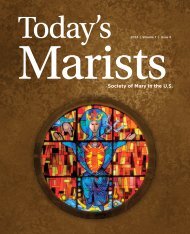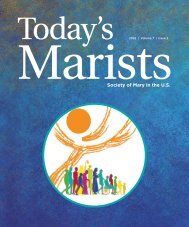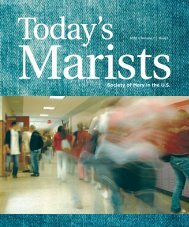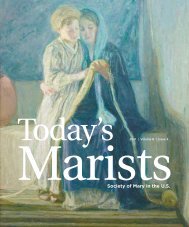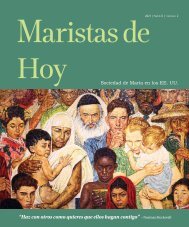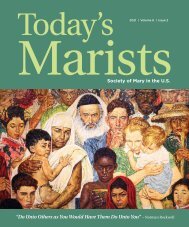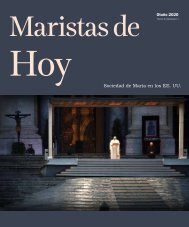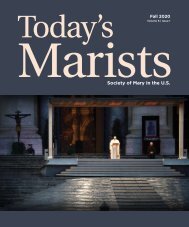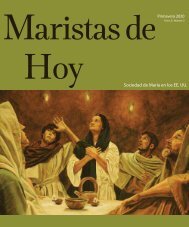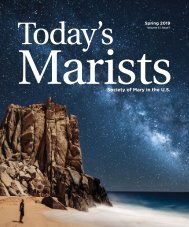Today's Marists 2024 Volume 8, Issue 2
You also want an ePaper? Increase the reach of your titles
YUMPU automatically turns print PDFs into web optimized ePapers that Google loves.
Top (L & R): World Interfaith Harmony Week <strong>2024</strong><br />
Bottom: Interreligious Sharing of Faith Experience<br />
during World Interfaith Harmony Week <strong>2024</strong><br />
son of mine was dead, and has come to life<br />
again; he was lost and has been found.” (Lk.<br />
15:23b – 24c) Jesus in the parable of the good<br />
Samaritan presents what it means to be a<br />
good neighbor to another. At the end of this<br />
parable, Jesus asked his listener who the<br />
neighbor was to the victim of the robbers.<br />
(Lk. 10:36b) The listener replied, “The one<br />
who treated him with mercy.” Then, Jesus<br />
said to the listener, “Go and do likewise” (Lk.<br />
10:37). Both parables speak of bridging and<br />
building relationships amid differences in<br />
cultures and religious traditions.<br />
To be a Christian is to follow the ways and<br />
lifestyle of Jesus. In John 15:12 the Lord Jesus<br />
says: “This is my commandment: love one<br />
another as I love you.” For us Christians,<br />
reconciliation is no longer an option, but<br />
rather it is our identity as disciples of Christ.<br />
To put it succinctly, the way Jesus loves us<br />
is the benchmark for our love for others.<br />
Jesus also, said, “Love your enemies and<br />
pray for those who persecute you, that you<br />
may be children of your heavenly Father, for<br />
he makes his sun rise on the bad and the<br />
good and causes rain to fall on the just and<br />
the unjust.” (Mt. 5:44 – 45) If we are truly<br />
faithful to who we are as followers of Christ,<br />
reconciliation is the only option, and love<br />
is the only way. Putting it into practice is<br />
more difficult than simply expounding this<br />
conviction verbally.<br />
In the realm of interreligious dialogue<br />
ministry, staying true to our identity is a<br />
significant challenge. Almost all major<br />
religions emphasize the importance of<br />
promoting good relationships with others,<br />
and the golden rule ‘Do to others as you<br />
would have them do to you’ (Mt. 7:12)<br />
embodies it clearly. Many other major<br />
religions worldwide including Islam,<br />
Buddhism, Judaism and Hinduism, share<br />
this golden rule. However, dialogue with<br />
others needs to go deeper into spirituality<br />
before a genuine reconciliation occurs. The<br />
Christian tradition holds that spirituality<br />
is a way of life that is guided by and in<br />
accordance with the spirit. It is a challenge to<br />
reconcile in a human way, especially when<br />
the other person has suffered a profound<br />
wound and numerous lives have been lost.<br />
For several years, I have been involved<br />
with the IRICD ministry in the Philippines<br />
(Mindanao) and most recently in Thailand.<br />
It is difficult to talk about peace when people<br />
are not reconciled.<br />
It is crucial to comprehend that<br />
reconciliation is not an automatic process<br />
in interreligious dialogue. The Marist<br />
IRICD program in Thailand is centered<br />
on promoting and sustaining the gradual<br />
development of mutual trust, understanding<br />
and friendship. We hope that this process<br />
will lead us to a deeper level of spirituality.<br />
When dialogue is infused with spirituality,<br />
it is possible to achieve reconciliation and<br />
peace. The spirit freely reconciles and<br />
enriches diversity, just like the wind blows<br />
where it wills. (Jn. 3:8a)<br />
<strong>Volume</strong> 8 | <strong>Issue</strong> 2 7




